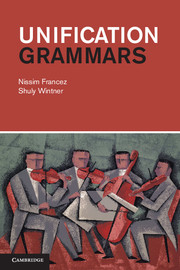Book contents
- Frontmatter
- Contents
- Preface
- Acknowledgments
- 1 Introduction
- 2 Feature structures
- 3 Unification
- 4 Unification grammars
- 5 Linguistic applications
- 6 Computational aspects of unification grammars
- 7 Conclusion
- Appendix A List of symbols
- Appendix B Preliminary mathematical notions
- Appendix C Solutions to selected exercises
- Bibliography
- Index
6 - Computational aspects of unification grammars
Published online by Cambridge University Press: 25 October 2011
- Frontmatter
- Contents
- Preface
- Acknowledgments
- 1 Introduction
- 2 Feature structures
- 3 Unification
- 4 Unification grammars
- 5 Linguistic applications
- 6 Computational aspects of unification grammars
- 7 Conclusion
- Appendix A List of symbols
- Appendix B Preliminary mathematical notions
- Appendix C Solutions to selected exercises
- Bibliography
- Index
Summary
In previous chapters we presented a linguistically motivated grammatical formalism and focused on its mathematical formulation. We said very little about the computational properties and processing of grammars expressed in the formalism. This chapter is concerned with such aspects. We focus on the expresiveness of the formalism, and on computational procedures for processing it.
The expressiveness of a linguistic formalism F (specifying grammars) determines the class of (formal) languages that can be defined by the grammars in F. Typically, it also bears on the computational complexity that is needed to solve the universal recognition problem with respect to the formalism. This is the problem of determining, given an arbitrary grammar G in F and an arbitrary string w, whether w ∈ L(G). Thus, context-free grammars define (all and only) the context-free languages; the universal recognition problem for CFGs can be solved in cubic time in the length of the input string. Regular expressions define the regular languages; the universal recognition problem for regular expressions can be solved in linear time. Also, Turing machines define all the recursively enumerable languages, but the universal recognition problem is undecidable for this formalism.
We begin this chapter with a discussion of the expressive power of unification grammars in Section 6.1. In Section 6.2 we show that unification grammars are equivalent to Turing machines. This implies that the universal recognition problem for the formalism is undecidable.
Information
- Type
- Chapter
- Information
- Unification Grammars , pp. 213 - 274Publisher: Cambridge University PressPrint publication year: 2011
